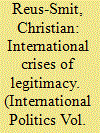| Srl | Item |
| 1 |
ID:
077882


|
|
|
|
|
| Publication |
2007.
|
| Summary/Abstract |
What is an international crisis of legitimacy? And how does one resolve such crises? This article addresses these conceptual issues, laying the theoretical foundations for the special issue as a whole. An actor or institution experiences a crisis of legitimacy, it is argued, when the level of social recognition that its identity, interests, practices, norms, or procedures are rightful declines to the point where it must either adapt (by reconstituting or recalibrating the social bases of its legitimacy, or by investing more heavily in material practices of coercion or bribery) or face disempowerment. International crises of legitimacy can be resolved only through recalibration, which necessarily involves the communicative reconciliation of the actor's or institution's social identity, interests, practices, norms, or procedures, with the normative expectations of other actors within its realm of political action
|
|
|
|
|
|
|
|
|
|
|
|
|
|
|
|
| 2 |
ID:
115031


|
|
|
|
|
| Publication |
2012.
|
| Summary/Abstract |
This article examines the reputational management strategies of national nongovernmental organizations (NGOs) involved in peace-building work in Sri Lanka between 2006 and 2007, a transitional period when the cease-fire was unraveling and the NGO sector was facing a "crisis of legitimacy." It traces the structural and proximate causes of the crisis and analyzes some of the ways in which NGOs were able to counteract the negative impacts that this criticism had on their legitimacy. This analysis challenges the mainstream view of NGO legitimacy as stable, unidimensional, and capacity-based by emphasizing the contested, highly politicized, and politically symbolic nature of NGO legitimacy in the Sri Lankan context. It also highlights the way in which national NGOs reframed and adapted peace-building agendas of international actors, challenging the popular view that liberal peace building functions hegemonically and that NGOs are compelled to follow the strategies of their international funders.
|
|
|
|
|
|
|
|
|
|
|
|
|
|
|
|